- Home
- Al Sarrantonio
Totentanz Page 9
Totentanz Read online
Page 9
The figure left the porch, coming toward her. As it neared, its features became clearer, finally resolving into those of a young girl: tall, with a boyish haircut but still, despite this, feminine. She was about fifteen years old, Frances knew, and there was something wrong with one of her ears—it was twisted and gnarled out of shape.
Walking hesitantly, the girl neared the huge barn, one of whose rust-red doors was wide open to reveal a coolly darkened interior. She paused, looking back pensively, and then abruptly entered.
In the pool at her feet, Frances followed the girl's progress. The barn was dark at first, and then the light adjusted. The floor was covered with sawdust and hay. A few wooden buckets and a mop were propped against one wall. There were two stalls against the back wall and a dimly seen and crooked staircase leading to an upper loft. The girl approached the stalls cautiously, her feet rustling the dry hay and sawdust. For a moment her hands groped outward. When she nearly reached the mouth of the first stall, she stopped, leaving the inside hidden from view. Then she took a hesitant step forward.
"Jeb?" she whispered, stepping back before any answer could come.
There was none.
"Jeb'!" she said again, and then, boldened by silence, she moved a little closer. "Jeb, you there?" Still there was no answer.
She took a long step closer and called out again, a little louder.
Another long step and she was standing at the opening to the stall.
A horse had been kept here at one time. As Frances watched, she could even smell the old horse smell that emanated from the cubicle. The hay was thicker here, padded up in one corner into a rough bed with a blanket to one side. The blanket gave off a musty odor. A roughly fashioned crucifix was nailed to the back wall, and a few books had been piled carefully in one corner. They were big art volumes. El Greco. Degas. Mondrian. There was an easel with a half-formed canvas on it, painted in wild colors. Other canvases leaned their faces to the wall. Frances knew what was on them: featureless shapes and lines in black and bright yellow and red. From a small hexagonal window high up at the other end of the barn, a sour yellow light bled into the stall.
The girl went toward the adjacent cubicle, moving as if walking on eggs. She put her head around the corner and looked in.
"Empty." she whispered to herself.
There came a rustle from the hayloft above her. "Come up here," a voice commanded.
The voice had her trapped. The front door of the barn was too far away to make a run for, there was nowhere to hide in the back stalls, and there was no other way out. She felt Jeb staring at her; it was as if his eyes gave out heat rays and were focusing tight beams down at her. He was in that kind of mood. But when the girl looked up, clutching her plaid dress tight with one hand, Jeb was not there.
"Come up here," Jeb's voice repeated. There was no hint of discussion in its firm, rasp-edged tone.
The girl went.
She rose into an oppressive atmosphere. It wasn't only the air, which was close and thick with heavy, choking smells: the odor of urine, a human body long unbathed, decaying food and damp clothing. There was something else above this, something she was moving into. It felt as though the area did not belong where it was, as though it had been wrenched from some other dimension and thrust into a place where it would not fit. The girl knew this feeling well; it was what she always felt when she was around Jeb. Wherever he was, he brought this feeling of dislocation with him. It was said in town, in whispered conferences, that bad luck, or something worse, followed Jeb like a canal barge in tow to a weighted pack horse. Most people crossed the street against his coming; the girl knew in her heart that she would do the same thing if the guilt-ridden bond of family did not attach her to him.
"Pull your carcass up here," Jeb said from over the lip of the steps. It sounded as though he were way off in the corner. His voice was oddly subdued.
The girl reached a tentative hand up over the top, then cried out as she was yanked upward into the loft. She tried to back down the ladder, but a cold hand clamped down on her head, resting there a moment before it groped farther to lift her under her armpit and haul her all the way up.
"I said come up, didn't I'?" Jeb said. She was thrown down at the back wall of the loft.
She could not see Jeb's face. The feeling of oppression was horrible up here, more horrible than it had ever been before. She knew something bad was about to happen. She could almost taste it, like iron filings in her mouth.
"What did I say about her?" Jeb asked. The girl was confused—and then she realized he wasn't speaking to her. His head was cocked to one side, he had lowered his voice, sounding as he never had before: respectful, almost. The girl turned to follow his gaze. She saw nothing. There seemed to be nothing there but a pile of darkness. And then the darkness gave a rattling cough that ended, after a hawking spit, in a low, rumbling laugh.
You told me just what you wanted," the unknown form said. There was a flash of what should have been fire, and was, but without brightness. A thin plume of smoke rose beside the strange shadow to snake darkly against the light from the hexagonal window.
"You never were one for saying what you meant," the form said.
Jeb did not respond. He stood unmoving; and then he stepped forward, grabbing the girl by the chin in a way that was oddly caressing.
"When?" he said to the shadow in a desperately angry voice.
"When I say," the other answered, and the way he said it made Jeb instantly release the girl and step back into his corner.
The shadow seemed to rise out of the floor like an apparition. The girl saw that he had been sitting on a milking stool. He was wrapped in some sort of short coat, the front of which swirled as he rose as though wind were passing through it. "I'm interested in this one," the form said, moving closer and into the light, where he could be seen.
The girl gasped. So did Frances, watching in the pool of visions. For a long moment Frances closed her eyes tight, trembling. She knew that face. For an instant, like a dreamer who awakens and just misses the essence of his dream, she knew the veil was lifted farther, and she almost grasped the whole. But then it moved back into place and complete understanding eluded her. She breathed deeply, her shivering diminished, and she was able to move her head away from the pool, which seemed frozen where she had left it, to look at the barber pole above her. It was just a barber pole. Had it been something else? She knew it had, but she didn't know what. Maybe she would never know. Her mind was in turmoil, half clear water and half mud, where before all had been mud. Night, she saw, had almost fallen; the sky was purple. When had she last seen a twilight? She could not answer the question. But there was no solace in this coming night. A greater cold and trembling waited for her in the real night than in the pool.
Knowing she must, she turned back to the pool.
The shadow man lifted his black cigarette to his mouth and stood regarding the girl with something that passed for mirth. At his approach, the girl cried out. Then she was silent. This thing was like a hundred Jebs. But she might yet escape. If she could not catch Jeb by surprise and bolt past him for the ladder, at least she might go straight over the side. It was a good fifteen-foot drop, but she had handled such a drop plenty of times—though into a good pile of hay. There might be enough sawdust and hay droppings at the bottom to break her fall.
The shadow spoke, and in spite of her resolution to run, she listened to him.
"Who is Jeb?" the creature asked, and she didn't know what he meant. He pointed a lazy, pale finger in Jeb's direction. Jeb started to say something, but a glance from the speaker quieted him.
"He's kin," the girl said.
The shadow laughed, throwing back his head languorously.
"That's true," he said. "What sort of kin?"
"He's my brother—sort of."
"Sort of?" The shadow produced another ghastly cigarette and lit it.
The girl was frightened. She didn't want to speak again, but as with climbing the l
adder, she knew she would have to.
"Half-broth—"
The shadow reached out in a movement similar to that of a quick-tongued snake catching a fly and took the girl by her bad ear.
"What is this?" he said, amused.
The girl cried out. The creature's touch made darkness burst into her eyes, and there was a freezing bolt of pain at the side of her head. At a gesture from the shadow, her legs collapsed and she fell to the floor.
"Who is Jeb?" the shadow asked again.
"Lay off, Ash," Jeb said. But there was no real power behind his words.
"Who told you Jeb was your brother?" Ash persisted.
The girl tried to get to her feet and fell again, legs cramped painfully.
"Jeb did," she gasped. "Jeb told me that."
"Jeb, are you brother to this kin of yours'?" Jeb was silent.
"Don't you know what the word abomination means?" Ash said to the girl with relish. "Hasn't anyone ever called you an abomination to your face'?" He threw her down, watching her roll from side to side, holding her head.
"Yes," the girl said.
"Don't you know what it means?" He motioned lightly at Jeb. "You tell her what it means." Jeb said nothing.
"It means . . . unclean in the sight of the Lord," the girl said haltingly.
Ash smiled. "And haven't you felt like an abomination? Haven't you been cast out from the realm of your fellows? Aren't you shunned on the streets when you walk?"
"No," the girl replied.
"What?" Ash said in mock surprise. "Is this true, Jeb?"
"There was no reason—" Jeb began.
"But, oh, there was," Ash said. "There was all the reason in the world. I thought you wanted her to share in this with you. I thought you wanted it to be hers as well.–
"I changed my mind," Jeb answered, still avoiding the dark man's eyes.
Ash laughed. "Do you really think she has a choice?"
"She should be able to make up her own mind!" Jeb shouted. Abruptly his voice lowered. "Like I did."
Frances pulled her eyes from the pool of visions again. She had remembered something, something terrible, and in the very act of remembrance, she had forgotten it again. But there was a feeling upon her of such deep dread that she wanted to cry out, to make it lift from her by bodily pushing it away. She looked at the barber pole again, and suddenly she remembered the three Hims—him I mourn, him who saves me, him whom I push away. The pole was the Northern Star again, the spinning heavens, the red and white of His death and resurrection, the moving yet always constant symbol of His salvation.
But there was no succor left in His arms. He was cold and distant, and she realized now that His distance was of her making. He was not with her because she had thrust Him away. Had He never been with her? She wasn't sure. But He was not there now. And she knew why. A memory crossed her mind: a body peeled dry of skin and blood, with arms stretched toward her before it collapsed into a heap of dry, white bones. Was it His body? No. Then the memory faded to mist, and she turned back to the pool, dreading what she would see, yet knowing that she must see it.
Each face in the loft was outlined in shadow. She could feel the sour dampness of Ash's breath when he spoke.
"Why don't you tell, her about your paintings, Jeb?"
"Can't we just get it done with and leave her out of it?"
Ash made a clucking noise. "Tell her about the paintings. I'll tell, if you like." His smile returned, a mockery of a human grin.
"Jeb was a wonderful painter," Ash said. "Everyone agreed that he was wonderful. He painted landscapes and pictures of beautiful women—especially older women—and everyone thought he had much talent. His paintings then were nothing like they are now, nothing like these obscene shapes and black hollows and straight red lines.
"Jeb was going to go away to Philadelphia, to painting school. Even his father, who balked for years at what he thought was the boy's hobby, came to realize the talent that was there. He had wanted Jeb to farm, but his mother wasn't the kind of woman to make her boy do what he didn't have in his heart. So she had secretly put money aside at each harvest until there was enough to send him to school.
"One night she announced this at the supper table, and his father got furious. He pounded on the table with his fist and stood up screaming that the boy and his mother had conspired against him, that she had stolen money from him. His wife screamed back, and the boy, only eighteen years old and confused, sat mute while they shouted at each other until his father suddenly fell over dead.
"They buried him, and then they found that he had been stealing money himself. He had run up gambling debts that were monstrous. Jeb and his mother owed half the people in town money, and although everyone thought Jeb a wonderful painter, they wanted their money and didn't give a damn if he went to school or not.
"So Jeb found himself running the farm, trying to keep his mother from having to give up the only home she had ever lived in. The money was gone, all of it, and soon they were barely able to make their way. Jeb's mother had never been very close to his father, but she had always worshiped Jeb, and soon they became closer than ever—"
Jeb interrupted Ash with a shout. He threw his hands to his face. The girl had never seen him shed tears. He stood sobbing dryly, clutching at his face as though he wanted to bury his thin white hands inside his head. "That's enough," he said through clenched teeth.
"She has to know," Ash replied. "There really is no choice in this, my friend." With a leering gusto, he resumed his story. "What your kin doesn't want to tell you is that his mother began to sleep with him." He paused to light another of his noxious cigarettes. "It was all very innocent—wasn't it, Jeb?— but it was incest." He relished the word. "An abomination if ever there was one. Then, of course, came the greatest abomination of all."
The girl stood silent as Ash favored her with his level gaze.
"A double kin," Ash said, barely keeping laughter out of his tone. "Jeb is both your brother and your father. An abomination, that's what you are. But the best is yet to come. Isn't it, Jeb?"
Jeb looked like white marble, a rigid statue. "Matricide!" Ash hooted gleefully.
"No!" Jeb shouted. He went on, his voice barely audible. "She died in childbirth."
"True!" said Ash. "Oh, the town found out about the pregnancy, naturally. Long before the birth date. Jeb and your mother were treated accordingly. Some said later, clacking their tongues, that it was the town that drove her to her death—that their words had started things off in Jeb's mind. Some said that Jeb was going to run away after the birthing, that he would go to New York and get a job and put himself through art school. That he would leave his mother, who loved him more than anything, because shame could not contain itself and would spill over. Those plans, naturally, were ruined when she died."
Jeb held his hands over his ears, his teeth bared in pain as Ash continued.
"Can you imagine the guilt? Oh, it must have been truly great. And hatred. If anything, the hatred was greater. It usually is when guilt can't contain itself. The hate he felt for those he saw as driving him to the decision, which, in his mind, had helped to kill his loving mother, was awesome. Here he was, trapped with a loathsome little baby, unnaturally conceived—and what was he to do?"
"He raised me as best he could," the girl said.
Ash's laugh was loud; it filled the barn and lasted a long time. His coat snapped in the air, and the girl saw that when Ash did not use his hands to bring his cigarette to his mouth, they seemed lost in his coat, invisible.
"Oh, this is truly wonderful," Ash said at last. His unearthly laughter seemed barely contained. "As best he could? Don't you know what he did?"
The girl glared at him, tears filling her eyes.
Ash turned to Jeb, then back to the girl.
"He killed himself, Jeb did. He put the barrel end of a clean shotgun into his mouth and blew his head off his neck."
Looking at this vision, Frances tried to scream. She found that she
could not pull away. The girl's face was lost to her completely; Frances herself was in the barn. When the girl's voice spoke, it came from her own mouth. She knew what this meant and tried to scream again.
"He raised me," she said hysterically. "He was there!"
"Oh, he was there," Ash replied. "At the moment he pulled that thick trigger he could not get out of his mind what this town had done to him. He was filled with hate for what this town had forced him to become. There was great guilt there, also—guilt that he was leaving you behind. But mostly raw, red hate. And he vowed vengeance! And lo—" Theatrically Ash pointed to Jeb.
The girl, Frances, had backed to the edge of the loft and glanced behind to see where she would land if she jumped; but in that second of hesitation, Ash was on her. A cold hand clamped on her bad ear.
"It's true," Ash hissed delightedly.
He twisted on the ear, and Frances jumped backward, landing with a scream on a hard spot below; she lay in pain as Ash laughed above.
Frances' eyes raised to Jeb, who stared down at her. His face was the face of a corpse: dry and white and filled, just below the surface, with crawling, wet things. His bones might be liquid; they might be gas; they might even be solid of a sort, but they were not living bones in a living man.
The pool of visions abruptly contracted, like water pulled down through a drain. Frances was looking at a patch of sidewalk under a bleak and dirty-yellow street lamp, with the otherworldly silence of a slowly rotating red-and-white barber pole above her. She watched the red stripe start at the bottom and climb languorously to the top and disappear into another, invisible place.
"Hello, Frances," she heard someone say. It was Ash's voice.
"Yes?" she said wearily, knowing that the veil had been lifted completely, that the third him, the him she had sought to push away, had found her. Vaguely, in her tired mind, she wondered why He had not saved her from this, had not allowed the veil to stay over her eyes forever.
"Frances," Ash said, his voice filled with soothing and comfort. It was a mother speaking to a child—a whispered promise of safe passage in a black night. "Frances, it's been a long time. I have something for you." She felt an icy touch against her palm and looked down to see a hard, dried thing, like a shriveled mushroom.

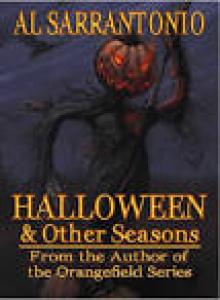 Five World Saga 01 Hornets and Others
Five World Saga 01 Hornets and Others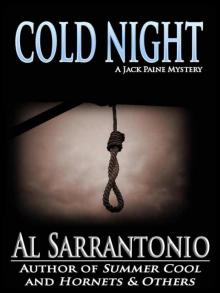 Cold Night (Jack Paine Mysteries)
Cold Night (Jack Paine Mysteries)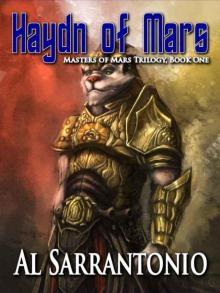 Haydn of Mars
Haydn of Mars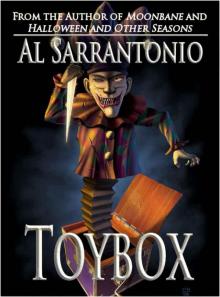 Toybox
Toybox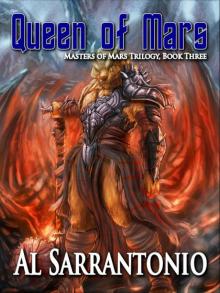 Queen of Mars - Book III in the Masters of Mars Trilogy
Queen of Mars - Book III in the Masters of Mars Trilogy Exile
Exile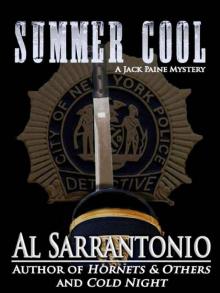 Summer Cool - A Jack Paine Mystery (Jack Paine Mysteries)
Summer Cool - A Jack Paine Mystery (Jack Paine Mysteries) Return - Book III of the Five Worlds Trilogy
Return - Book III of the Five Worlds Trilogy The Orangefield Cycle Omnibus
The Orangefield Cycle Omnibus Summer Cool jp-2
Summer Cool jp-2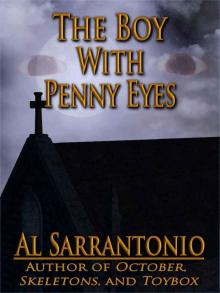 The Boy With Penny Eyes
The Boy With Penny Eyes Journey - Book II of the Five Worlds Trilogy
Journey - Book II of the Five Worlds Trilogy Kitt Peak
Kitt Peak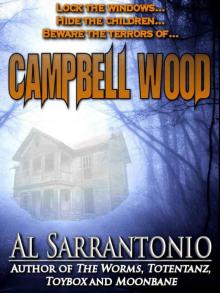 Campbell Wood
Campbell Wood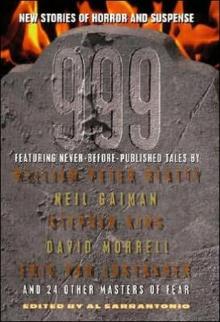 999
999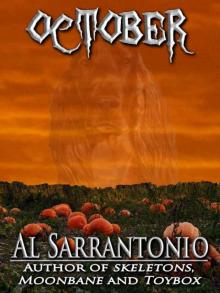 October
October Sebastian of Mars
Sebastian of Mars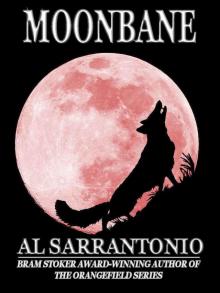 Moonbane
Moonbane Totentanz
Totentanz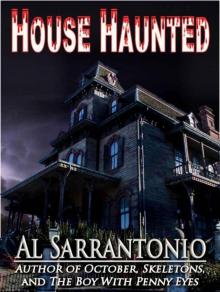 House Haunted
House Haunted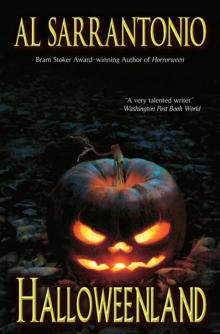 Halloweenland
Halloweenland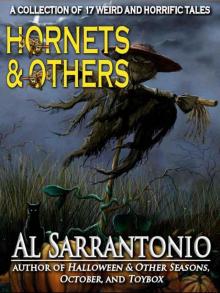 Hornets and Others
Hornets and Others